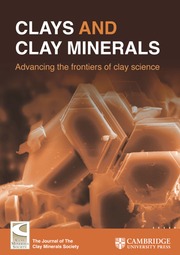Article contents
Hydroxy Interlayers in Expansible Layer Silicates
Published online by Cambridge University Press: 01 July 2024
Abstract
Vermiculites and smectites in soils and sediments are frequently partially interlayered or “chloritized”. Dioctahedral expansible layer silicates are those most frequently interlayered, and hydroxy-Al appears to be the principal component of the non-exchangeable interlayer material.
The most favorable soil conditions for interlayer formation appear to be: moderate pH (4·6–5·8), frequent wetting and drying cycles, and low organic matter content.
In marine sediments, hydroxy-Mg interlayering may be significant. Soil-derived clays containing partially filled hydroxy-Al “brucite” sheets may be filled out with hydroxy-Mg. Under reducing conditions, hydroxy-Fe interlayers may be important.
Depending on the OH/Al ratio and Al content of hydroxy-Al interlayers, expansible layer silicate may either promote or retard the formation of gibbsite. Interlayered expansible layer silicates also may be precursors to kaolinite.
Résumé
Les vermiculites et les smectites en sols et sédiments sont souvent partiellement répartis en feuillets interstratifies ou “chlorées”. Les silicates en couches expansibles dioctaédriques sont celles qui sont le plus souvent en feuillets interstratifies et l’hydroxy-Al apparaît être le principal composant du matériau non-interchangeable de la feuillet interstratifie.
Les conditions du sol les plus favorables pour la formation de feuillets interstratifies semblent être: un pH 4,6–5,8 modéré, de fréquents cycles d’humidité et de sècheresse, et une faible teneur en matière organique.
Dans les sédiments marins, une feuillet interstratifie d’hydroxy-Mg peut être importante. Des argiles dérivées du sol contenant des feuillets de “brucite” partiellement remplies d’hydroxy-Al peuvent être remplies d’hydroxy-Mg. Dans certains conditions, les feuillets interstratifies d’hydroxy-Fe peuvent être importantes.
Selon le rapport OH/Al et la teneur en Al’dhydroxo-Al des feuillets interstratifies, le silicate de la feuillet expansible peut soit activer, soit retarder la formation de gibbsite. Les silicates en feuillets interstratifies de la feuillet expansible peuvent aussi être les précurseurs de kaolinite.
Kurzreferat
Vermiculite und Seifensteine in Böden und Ablagerungen sind häufig teilweise mit Zwischenschichten versehen oder “chlotitisiert”. Am häufigsten kommen Zwischenschichten in den dioktahedralen Silikaten mit Quellschichten vor und der Hauptbestandteil des nicht-austauschbaren Zwischenschichtmaterials scheint Hydroxy-Aluminium zu sein.
Die günstigsten Bodenbedingungen für die Bildung von Zwischenschiehten sind scheinbar die folgenden: mässiges pH 5,6–5,8, häufige Nass-und Trockenzyklen, und niedriger Gehalt an organischem Material.
In Meeresablagerungen kann eine bedeutende Zwischenlagerung von Hydroxy-Magnesium vorkommen. Aus dem Boden stammende Tone, die teilweise gefüllte Hydroxy-Aluminium “Brucit” Schichten enthalten, können durch Hydroxy-Mg ausgefüllt werden. Unter Reduktionsbedingungen können Hydroxy-Fe Zwischenschichten von Bedeutung sein.
Je nach dem OH/Al Verhältnis und dem Al Gehalt der Hydroxy-Al Zwischenschichten können Silikate mit Quellschichten die Bildung von Gibbsit entweder fördern oder verzögern. Silikat-Quellschichten mit Zwischenschichten können auch Vorläufer von Kaolinit sein.
Резюме
В грунтах и отложениях вермикулиты и смектиты обычно переслогны частично или-же подвергнуты хлоритизации. Диоктаздрииеские расширяемые слоистые силикаты чаше всего переслоены и главной составляющей необменного прослоенного материала является гидрокси-Аl.
Наиболее благоприятные грунтовые условия для образования прослойков вероятно: умеренное рН (4,6-5,8), частые циклы смачивания и сушки и малое содержание органических веществ.
В морских отложениях, прослаивание гидрокси-Мg может оказаться значительным. Полученные из грунта глины содержат слои брусита, частично наполненные гидрокси-А1, которые могут быть выполнены гидрокси-Мg. В восстановительных условиях важными могут оказаться прослойки гидрокси-Ре.
В зависимости от отношения ОН/Аl и от содержания в прослойках гидрокси-Аl, расширяемые слоистые силикаты активируют или замедляют образованиг гибсита. Прослоенные расширяемые слоистые силикаты могут также являться предшественниками каолинита.
- Type
- Research Article
- Information
- Copyright
- Copyright © 1968, The Clay Minerals Society
Footnotes
An invited paper presented at the 16th Clay Minerals Conference, Denver, Colorado.




